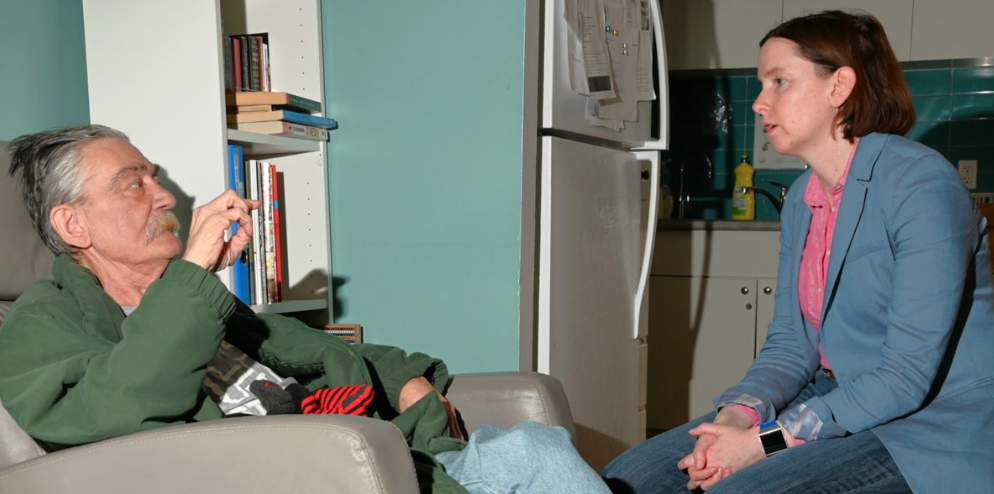
All News

A warning from the Canadian Physicians for Life
A message from Canadian Physicians for Life warning against the scheduled 2027 expansion of MAiD eligibility to persons whose sole underlying condition is mental illness. It cites personal testimony, including MP Andrew Lawton’s account of surviving a suicide attempt and living with depression, to argue that extending euthanasia in these circumstances would abandon vulnerable people rather than care for them. The article also points to the ongoing parliamentary review and urges readers to contact their MPs in support of Bill C-218, which would cancel the planned expansion.
By: The Catholic Register

An Alberta man wanted MAID. Instead, he died in a Catholic hospital, waiting to be transferred
An Alberta man who was approved for Medical Assistance in Dying but was unable to receive it at Edmonton’s Grey Nuns Hospital because the site is run by Covenant Health, a Catholic provider that does not allow MAiD on-site. He instead had to be transferred to another facility, but died before that could happen. It also includes commentary from Dr. Andrea Letourneau, a critical care specialist and MAiD provider, who argues that forced transfers impose additional burdens on patients seeking an assisted death. The piece presents the case as a concrete example of the practical consequences of institutional non-participation in MAiD within a publicly funded health system.
By: Stephanie Dubois

Days after MAiD trial ends, Archbishop urges vigilance for Catholic hospitals
Archbishop Richard Smith urged Catholics to remain vigilant in defending the mission of Catholic healthcare. The piece explains that the case centers on whether publicly funded Catholic hospitals in British Columbia can continue operating according to their religious ethics, particularly under the 1995 Master Agreement between the province and the Denominational Health Association. In his World Day of the Sick homily, the Archbishop describes Catholic hospitals as central to the Church’s healing ministry and argues that their mission and integrity should be recognized, valued, and protected within the wider provincial health system.
By: The B.C. Catholic

Accommodating Catholic health care presence and conscience
This article illustrates how Catholic healthcare has long been part of Canada’s publicly funded health system and that its continued presence depends on preserving space for institutional and individual conscience. The piece also claims that newer federal standards are increasing pressure on healthcare workers by expecting them to raise euthanasia with eligible patients and, in some cases, make effective referrals. It presents these developments as part of a broader shift from accommodation toward coercion in matters of conscience.
By: The B.C. Catholic

When Doctors’ Faith Loses to Bureaucratic Power
This article argues that legal and regulatory pressure in Canada is threatening the religious freedom of doctors and faith-based hospitals when institutional beliefs conflict with secular medical law. The piece focuses on a case in British Columbia involving a Catholic hospital that denied on-site access to Medical Assistance in Dying leading a family to sue to compel the facility to allow the procedure. The author claims that forcing medical professionals or institutions to participate in or permit services that contradict their moral convictions undermines freedom of conscience and religious liberty under the Canadian Charter of Rights and Freedoms.
By: Wesley J. Smith

B.C. government struck compromise with assisted dying policy, court hears
This article reports on evidence presented in the British Columbia Supreme Court during a legal dispute over how the province’s assisted-dying policy applies to faith-based hospitals. The court heard that the provincial government reached a “compromise” policy intended to balance access to medical assistance in dying with respect for religious objections by some hospitals, particularly Catholic facilities that do not provide MAID on site. Government witnesses described efforts to ensure patients approved for MAID can receive the procedure without forcing faith-based institutions to act against their beliefs. The testimony also highlighted the role that faith-based facilities, including St. Paul’s Hospital in Vancouver, play in the broader health system and the complexity of maintaining both access and institutional identity.
By: Tara Carman

Families want Canadian provinces to end MAID opt-out policy for faith-based hospitals
Catholic-affiliated hospitals, including St. Paul’s Hospital in Vancouver, prohibit participation in MAID due to religious doctrine, requiring patients who are approved for the procedure to be transferred to non-religious facilities. Patient advocates and families argue that these transfers can cause additional suffering and distress, particularly for patients who are seriously ill or near death. The article highlights cases where patients were moved shortly before dying, prompting legal action by advocacy groups who claim the policy violates patients’ rights and undermines access to publicly funded health care services. Supporters of the policy argue that religious institutions should be permitted to operate in accordance with their beliefs while continuing to provide other essential medical services. The issue is now before the courts.
By: Caroline Barghout

France’s assisted suicide bill and the forced secularization of Catholic healthcare
This article argues that France’s proposed assisted-suicide law would threaten the religious freedom and continued operation of Catholic hospitals, care homes, and nursing homes if they refuse to permit euthanasia or assisted suicide on their premises. The piece states that the bill, already adopted by the French National Assembly and under review in the Senate, would require all healthcare and medico-social institutions, public and private, to allow the practice regardless of their religious identity, with refusal treated as a criminal offence. It further claims that directors of Catholic institutions could face prosecution, fines, and loss of public funding, and presents this as an unprecedented denial of institutional conscience.
By: The Catholic Herald

Euthanasia in France: Catholic Institutions Seriously Threatened
This article reports on concerns among Catholic groups in France over a proposed national euthanasia and assisted-dying law that would require all healthcare institutions to permit euthanasia on their premises. Legal experts and advocates, including the European Centre for Law and Justice, argue that under the draft text, Catholic hospitals, nursing homes, and care facilities could face criminal prosecution, fines, or loss of public funding if they refuse to allow euthanasia. Critics say the bill would force faith-based institutions to act against their moral and religious commitments or face penalties ranging up to prison sentences for directors. Supporters of the Catholic position warn this represents an unprecedented threat to the freedom of religious health-care providers and stress the need to defend institutional conscience rights.
By: FSSPX NEWS

US to boost Christian hospitals in Nigeria amid efforts to protect believers from violence
This article reports that the United States and Nigeria have signed a five-year, $5.1 billion health cooperation agreement that includes significant new support for Christian hospitals and clinics in Nigeria. Under the memorandum of understanding, about $200 million of U.S. funding is designated for more than 900 Christian faith-based health facilities that serve more than 30 percent of the Nigerian population, despite accounting for only about 10 percent of all providers. The funding is intended to help expand integrated health services including HIV, tuberculosis, malaria, maternal and child health, and other essential care in regions served by Christian-run institutions. The agreement also links continued U.S. assistance to Nigerian reforms aimed at protecting vulnerable Christian populations from violence.
By: Anugrah Kumar

MAiD for mental illness: ‘Canada is pioneering resignation'
The article reports on the first-reading of Bill C-218, which aims to block the planned expansion of medical assistance in dying to people whose only underlying condition is mental illness. Liberal and Bloc Québécois MPs signalled they are likely to oppose the bill and instead wait for the findings of a joint parliamentary committee on MAiD set to convene in early 2026, while opponents of the expansion argued that safeguards are already failing and that Canada is not prepared to extend eligibility to mental illness alone.
By: Quinton Amundson

Dialysis one way, MAiD the other ? Critics sound alarms about Vancouver clinics offering life or death
Critics, including the head of a prominent anti-MAiD organization raised concerns about the increasing presence of clinics offering the procedure in Vancouver near those that offer health services, such as dialysis. Critics argue that the proximity of services that sustain life and those that end it raises ethical question about how MAiD is integrated into the health system. They say these developments highlight broader unease among pro-life advocates about how MAiD is being normalized in settings where patients face critical decisions about life and death.
By: Terry O’Neil

Doctors alarmed by Health Canada's push for MAiD talks with patients
Some Canadian doctors are raising concerns about a Health Canada “Model Practice Standard” that would encourage physicians and nurse practitioners to raise the possibility of medical assistance in dying (MAiD) with patients they believe might be eligible and receptive. Critics argue that the guideline could amount to “compelled speech” and influence vulnerable patients toward considering euthanasia. A Health Canada spokesperson said the standard was developed with input from regulatory bodies and clinicians, but reiterated that the federal government cannot force provinces or health authorities to adopt it.
By: Terry O’Neill

Delta Hospice looks to Alberta for “sanctuary hospice” site after being “stonewalled” by B.C. government
The Delta Hospice Society, which provides secular, palliative care, is planning to establish a MAiD-free “sanctuary hospice” in Alberta after facing resistance from the B.C. government. With funding secured and potential properties visited, the Society seeks Alberta's protection from being compelled to offer euthanasia, something they oppose based on their commitment to traditional palliative care principles. Their original facility in B.C. was seized in 2021 when they refused to allow MAiD, as the Society didn’t qualify for faith-based exemptions.
By: Terry O’Neil

MAiD unit, forced onto Catholic-run hospital campus in Canada, now operational
A government‑mandated MAiD unit has begun operating on the campus of St. Paul’s Hospital in Vancouver, a Catholic‑run facility sponsored by Providence Health Care. Despite the hospital’s policy of not providing MAiD, British Columbia’s health authority established and operates the unit on adjacent hospital land connected by a corridor, while Providence continues to transfer patients seeking MAiD to that space rather than offering it internally.
By: Terry O’Neill

Euthanasia facility quietly opens at St. Paul’s Hospital in Vancouver
A new Medical Assistance in Dying facility has opened adjacent to St. Paul’s Hospital in Vancouver, on land taken over by the provincial government. Connected via a corridor to the Catholic-run hospital, the clinic is staffed and operated by Vancouver Coastal Health rather than Providence Health Care, maintaining a strict separation. Providence clarifies that MAID is not performed within its Catholic facility, aligning with their religious directives.
By: Terry O’Neill

Canada Launches ‘national consultation' on ‘advance requests' for euthanasia
The Canadian government is seeking public feedback on a proposal to allow "advance requests" for euthanasia, enabling individuals to arrange for medically assisted death before becoming incapacitated. This initiative follows Quebec's earlier adoption of similar policies for patients diagnosed with severe, incurable illnesses like Alzheimer’s. While the federal government describes this as a complex issue, it aims to ensure that the euthanasia program is responsive to Canadians' needs, supports autonomy, and protects vulnerable individuals. This proposal continues the expansion of the MAiD program, which has been contentious since its inception in 2016.
By: Daniel Payne

Sister Philip Marie Wanted to Live. But a Catholic Senior Center Killed Her
Sister Philip Marie Burle, a Catholic nun living in a Missouri senior care facility, was denied the care she wanted and was instead subjected to the withdrawal of food and water and heavy sedation against her wishes. The piece presents her death as evidence that vulnerable patients can be steered toward death by caregivers even in institutions that identify as Catholic. It also uses her case to argue that some Catholic healthcare facilities have abandoned their religious mission and become complicit in broader end-of-life practices the author views as morally wrong.
By: Bobby Schindler

Catholic Medical Association Exposes Fight Against Normalizing Assisted Suicide
The American Medical Association (AMA) is set to discuss two resolutions regarding assisted suicide at an upcoming interim meeting. One resolution proposes to stop "criminalizing" doctors, patients, and families involved in assisted suicides, replacing the term "assisted suicide" with "Medical Aid In Dying" (MAID). The other resolution proposes the AMA take a neutral stance on assisted suicide.
Dr. Tim Millea from the Catholic Medical Association opposes these resolutions, expressing concern about the younger generation's perspective and advocating for care over ending lives unnaturally. The AMA's decisions hold significant sway in legislation at state and federal levels.
By: Madalaine Elhabbal

Vatican wrong to open door to euthanasia says LCP whistleblower
A former hospital doctor in Malta who is now an archdiocese speaks out about the Pontifical Academy of Life’s statement that in some situations, euthanasia is acceptable. He strongly disagrees with depriving patients of food and nutrients, particularly the elderly. Moreover, he says that the motivation is to reduce costs. He hosted a lecture on LCP, Liverpool Care Pathway, which delivers euthanasia, and explained how it abuses its power over patients. His lecture prompted families to come forward with their experiences of abuse under LCP. As a result, the government requested an inquiry, and as a result of the inquiry, the LCP was abolished.
By: Simon Caldwell